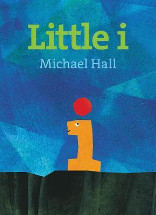Little i by Michael Hall

Greenwillow Books, 2017. ISBN 9780062383006
The alphabet letters were quite happy being what they were until one
day Little i's dot fell off. It rolled down a hill, tumbled over a
cliff and splashed into the sea. Little i felt weird and the other
letters felt confused because now Little i looked like a number and
you can't make words with numbers.
So Little i decided to find his dot and starts off on an adventure
that takes him to some interesting places. His question mark boat
takes him across the seas until he finds an island that has a
remarkable sea passage that passes a spectacular exclamation point
waterfall, through the cold dark parenthesis tunnel (with asterisk
gems), through the field of lovely comma sprouts, across the
spine-chilling hyphen bridge to the very edge of the land where his
dot completes his journey like a full stop at the end of a sentence.
But when Little i puts his dot back on he feels strange, setting his
quest and his story up for an imaginative and fun end.
With bold shapes and colours, this is one of those books that seems
really simple on the surface but then you wonder what sort of mind
could make such a story. But then he did write Red, a crayon's
story. Not only is it clever it is brilliant, so rich in so
much for the very young reader. Little i feels incomplete without
his dot and that he doesn't really belong in the alphabet, just as
some children feel adrift if they haven't got their mum, a special
friend or a favourite toy by their side and so talking about Little
i's story may help them realise that they can not only survive
without that security blanket but be even better for being brave
enough to leave it behind. Self-confidence in who we are is such a
critical part of growing up.
It is also wonderful for those who are just beginning to understand
that words are constructed from letters - Hall shows this by having
the letters in the words do their talking; distinguishing between
letters and numerals; and maybe starting to wonder what the other
marks on the page are. There is a myriad of talking and teaching
opportunities as the children demonstrate their knowledge of those
initial concepts about print that are part of early kindergarten
assessments. Yet, whatever level the child is at for looking at the
technicalities and tools of language, overall and throughout there
is an engaging story and a satisfying finish which have to be at the
core of anything we share with little ones if they are to love
stories and reading and all that they offer.
Barbara Braxton